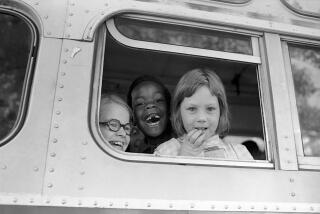Grabbing a Few Thorny Issues in the Debate on Integration
In the rancorous debate on race, two camps have defined themselves with increased clarity in the past year. On one side are the “optimists,” who proudly point to the growth of the black middle class and hail the end of racism. Facing off against them are the “pessimists,” who denounce growing income inequality and decry racism’s tenacious grip. Crashing into this dichotomized debate is Orlando Patterson’s new book, “The Ordeal of Integration.” Patterson is, clearly, a man who does not recognize any imperative to respect others’ categories.
Patterson takes sharp aim at everyone from white liberals, with their patronizing “sensitivities,” to free-market conservatives, whose argument “that the poor ought to be abandoned for their own autonomous good is hypocritical nonsense.” Other targets include whites who exaggerate their economic hardships (“the biggest whiners of all”) and Afrocentrists who are busy “leapfrogging the Atlantic, the Sahara, and the last five thousand years” in their quest for a glorious past.
Patterson’s aim is ambitious: to reconfigure the racial debate. (In fact, he considers the whole concept of race obsolete and substitutes “Afro-American” and “Euro-American” for “black” and “white.”) He argues that, in the past 40 years, the majority of Afro-Americans have made an astonishing, stirring transition from “a truly debased ex-slave people” to “full members of . . . the nation’s moral community and cultural life.” But he also supports affirmative action--on both practical and moral grounds--and skewers the “uninvited anguish” of neoconservatives who worry that it offends black dignity. He warns that the growth of income inequality is a far greater threat than racism. And he insists that the underclass, rather than representing a disgusting cultural aberration, is truly, terrifyingly American: “In the pathologies of the urban underclass youth, Americans see the values of their own materialist culture in broad billboard colors, staring back at them.”
*
The “ordeal” Patterson refers to stems not from the failure to achieve integration but precisely from its success. Integration and increasing equality, Patterson argues, paradoxically create discord: “as the relations between the previously segregated groups change, becoming objectively better for Afro-Americans, they will be experienced by Afro-Americans as getting much worse even as they are genuinely seen by Euro-Americans to be improving. Both perceptions will be correct.”
What appears to be a growing distrust between the races is the result of our belated embrace of the Other’s humanity: “Like a woman chased and held down in a pitch dark night who discovers, first to her relief, then to her disbelief, that the stranger recoiling from her in the horror of recognition had been her own brother, the moral embrace of integration is a liberation with a double-take of outrage verging on incomprehension.”
Patterson is most interesting in his philosophical discussion of agency and victimhood. He argues that “autonomy and self-determination, far from being incompatible with an activist government, often require it.” He develops the thesis that “ ‘blaming the system’ has become more than a substitute for fate, and . . . actually accounts for the high self-esteem found among lower-class Afro-Americans.” However, his main solution to the crisis of black teenage pregnancy is bizarre: He proposes barring male students who get a girl pregnant from playing varsity sports and predicts, “In time, avoiding pregnancy will become the cool thing to do.” This proposal--which makes black girls virtually irrelevant--is especially surprising coming from Patterson, who, in his brilliant 1991 book “Freedom in the Making of Western Culture,” claimed such a central role for women in the invention of personal agency.
There are methodological problems with “The Ordeal of Integration,” stemming mainly from Patterson’s reliance on public opinion polls that simplify complex truths. (What does it mean that, according to a 1994 poll, 78% of blacks “said that they were either very happy or pretty happy”?) And there is much in this book that will make Americans of all classes, races and political tendencies wince. Which is why, of course, it should be read.
More to Read
Sign up for our Book Club newsletter
Get the latest news, events and more from the Los Angeles Times Book Club, and help us get L.A. reading and talking.
You may occasionally receive promotional content from the Los Angeles Times.







